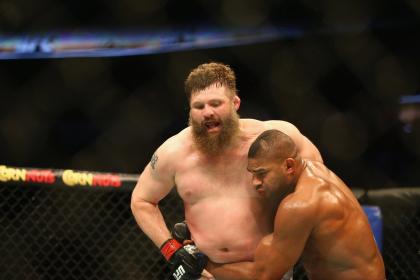Roy Nelson still skeptical in new era of UFC drug testing
Roy Nelson has been a heavyweight fighter in the UFC for half a decade, and in that time, "Big Country" has fought 14 times against former champions and contenders in an era that can only be described as confusing.
Nelson debuted as a winner of "The Ultimate Fighter" reality show in 2009. At the time, steroids were rampant and Testosterone Replacement Therapy (TRT) was even legal in the state of Nevada.
Fighters were jacked up and commissions struggled with consistency and transparency in their testing procedures.

Nelson, now 39, with his protruding belly, is not exactly the poster child for potential steroid abuse unlike some of his hulking contemporaries.
Now at the tail-end of his hard-nosed career, Nelson finds himself in a different world. The sport is cleaner, and measures are in place to ensure future generations will compete on a more level playing field. The penalties are stiffer and the tests are becoming more frequent.
Still, Nelson remains skeptical.
"A cleaner sport is always good, but as you know, there's still ways around it," Nelson told Yahoo Sports.
Drug testing and commission integrity is of course the topic du jour in the MMA world and Nelson didn't hold back in ranting about the Nevada Athletic Commission, their inconsistencies, and the relationship between United States Anti-Doping Agency (USADA) and the UFC.
He specifically questions the timing of Anderson Silva's failed drug test before a fight with Nick Diaz at UFC 183 in January. Silva tested positive for an anabolic steroid on January 9, yet was still allowed to fight Diaz three weeks later.
And that's what Nelson can't understand: Why was Silva allowed to fight Diaz if he tested positive for steroids on Jan. 9, and the fight wasn't until Jan. 31?
When Nelson was informed that USADA claimed the results were not made available until after the fight had already happened, he replied, "Gotcha. Then why even bother testing that far out? If you can only find out until after, then why don't we just test the day-of and call it a day."
He makes a good point.
There is certainly room for improvement in the new USADA-UFC partnership.
On the surface, any attempt at cleaning up the sport of MMA is welcome. However, there are still gray areas like the Anderson Silva case and Nelson's question of: If you can only find out after, why test before?
It's understandable why Nelson is so preoccupied with NSAC, USADA and steroid talk; he faces repeat steroid abuser Josh Barnett on a UFC Fight Night card in Japan on Saturday.
The former UFC heavyweight champion first tested positive for steroids (two of them, actually) at UFC 34 in Nov. 2001. Barnett escaped with a warning from the NSAC and was allowed to continue his career without any further sanctioning.

Apparently the warning didn't stick.
In April 2002 – not even a full year after his positive test at UFC 34 – Barnett tested positive for Boldenone, Nadrolone and Fluoxymesterone, after his UFC title win over Randy "The Natural" Couture.
He was stripped of the title by NSAC and suspended six months after the positive test came to light.
Barnett's third and final positive steroid test came in July 2009 before his Affliction main event fight against Fedor Emelianenko. The positive test for the anabolic steroid Drostanolone was just 10 days before the fight, and it forced the cancellation of the entire event.
Affliction would never hold another show.
So, with all this in mind, Nelson must be a little concerned, right?
"There's USADA, right? The UFC says USADA will be there, so I should be OK," he said with sarcasm.
If Nelson is concerned, he isn't showing it – which is rather surprising, considering he's a meager 1-4 in his last five fights.
As Nelson is quick to point out, however, this is the heavyweight division. And in this stagnant, repetitive division of giants, you are potentially just one or two wins away from a shot at UFC gold.
Nelson made his career on ultra-brutal performances against some of the heaviest hitters the sport has ever seen. At 7-7 in his UFC career, a lesser fighter would be worried about job security, but not Nelson.
That is because he knows how to keep the bosses happy.
"One thing about our business: If we aren't entertaining, people don't want to watch. If that's the case, then people would just start watching soccer.
"As long as you're making the fans happy – they're the one's paying the bills. They pay the UFC, then the UFC pays us. So, without them, we're nothing. So I always look at the Big Boss: The fans. As long as I'm making them happy, then I'll always have a job."
- - - - - - -
Ryan McKinnell is a contributor for the Yahoo Sports Cagewriter blog. Have a tip? Email him or follow him on Twitter!

